Latest Blogs
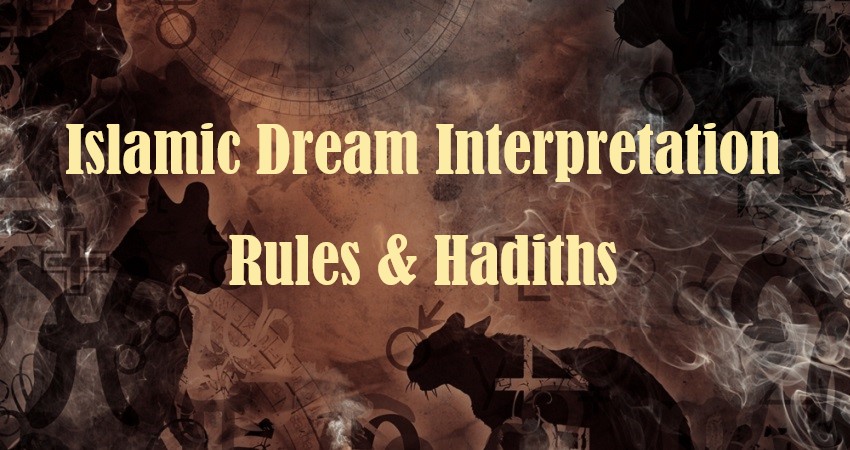
Khawab ki Tabeer: Islam & Qur’an
Dreams have always fascinated humanity, often seen as mysterious windows into the unseen. In Islam, however, dreams are not mere imagination or superstition they carry spiritual weight and guidance when understood correctly.Indeed, known as khawab ki tabeer in Urdu, dream interpretation in Islam is a discipline rooted in the Qur’an and Sunnah. Moreover, it is a sensitive subject, one that requires knowledge, wisdom, and faith.
For centuries, therefore, Muslims have turned to the Qur’an, Hadith, and the guidance of scholars to understand the role of dreams in their lives. The Prophet Muhammad ﷺ taught that some dreams are glad tidings from Allah, while others may be whispers from Shaytan or reflections of one’s inner self.
In this comprehensive guide, we will therefore explore the meaning of dreams in Islam (khawab ki tabeer in Islam), their classifications, evidence from the Qur’an and Sunnah, as well as guidelines for authentic interpretation, common dream symbols, and finally, the dangers of false interpretations. Ultimately, by the end, you will gain clarity on what Islam truly teaches about dreams and their interpretation.
What This Blog Will Cover:
In this article, we’ll cover:
- The meaning of dreams in Islam (ru’ya, hulm, hadith al-nafs).
- Qur’anic verses and Prophetic traditions about dreams.
- The three types of dreams.
- Guidelines for proper interpretation (khawab ki tabeer).
- Famous examples of dreams in the Qur’an and Sunnah.
- Common dream symbols in Islamic tradition.
- Misconceptions, superstitions, and dangers of false interpretation.
- Moreover, the Spiritual Benefits of Understanding Dreams Correctly
What is the Meaning of Dreams in Islam (Khawab ki Tabeer in Islam):
In general, Islamic scholars classify dreams into three categories, derived from authentic Hadith:
- Ru’ya (Good Dreams) – These come from Allah and bring glad tidings or spiritual lessons.
- Hulm (Evil Dreams) – These are from Shaytan, causing fear, sadness, or confusion.
- Hadith al-Nafs (Self-talk Dreams) – These arise from one’s subconscious mind, daily worries, or desires.
Abu Huraira reported Allah’s Messenger (ﷺ) as saying:
“When the time draws near (when the Resurrection is near) a believer’s dream can hardly be false. And the truest vision will be of one who is himself the most truthful in speech, for the vision of a Muslim is the forty-fifth part of Prophecy, and dreams are of three types: one good dream which is a sort of good tidings from Allah; the evil dream which causes pain is from the satan; and the third one is a suggestion of one’s own mind; so if any one of you sees a dream which he does not like he should stand up and offer prayer and he should not relate it to people,
and he said: I would love to see fetters (in the dream), but I dislike wearing of necklace, for the fetters is (an indication of) one’s steadfastness in religion. The narrator said: I do not know whether this is a part of the hadith or the words of Ibn Sirin.”
(Sahih Muslim, 2263a)
Thus, Islam distinguishes dreams carefully; not every dream has a hidden meaning, and not all should be interpreted.
Qur’an and Sunnah on Dreams:
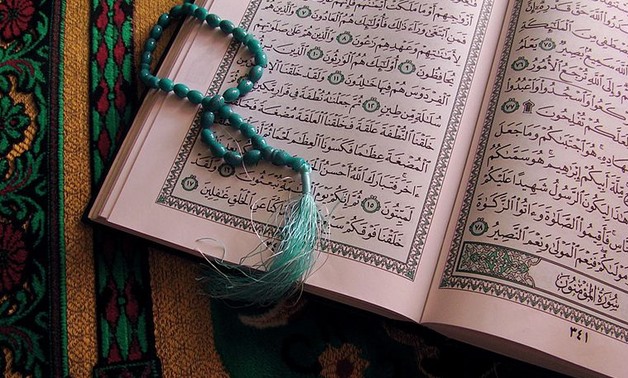
Indeed, dreams hold an honored place in Islamic history and scripture.
Prophet Yusuf (Joseph) عليه السلام
Interestingly and significantly, the Qur’an dedicates an entire chapter, namely Surah Yusuf, to dreams and their interpretations. In this Surah, Yusuf عليه السلام saw in his childhood:
“˹Remember˺ when Joseph said to his father, “O my dear father! Indeed I dreamt of eleven stars, and the sun, and the moon—I saw them prostrating to me!”
(Qur’an 12:4)
This dream came true when his parents and brothers honored him later in life.
Prophet Muhammad ﷺ
The Beginning of Revelation Through True Dreams
According to authentic narrations in Sahih al-Bukhari, the first form of revelation to the Prophet Muhammad ﷺ came through true and meaningful dreams that would come true as clearly as daylight. This marked the beginning of divine communication and spiritual preparation for prophethood.
Soon after, Allah instilled in him a love for solitude, and he would retreat to the Cave of Hira to worship and reflect. It was during one of these moments of seclusion that the Angel Jibreel (Gabriel) descended and commanded him to read, initiating the first revelation, “Read in the name of your Lord who created.”
Therefore, this event signifies how dreams played an essential role in the early stages of prophethood, serving as a transition from divine visions to direct revelation.
If you wish to read the complete Hadith in its original wording, you can view it here.
Narrated Abu Qatada:
“The Prophet (ﷺ) said, “A good dream is from Allah, and a bad or evil dream is from Satan; so if anyone of you has a bad dream of which he gets afraid, he should spit on his left side and should seek Refuge with Allah from its evil, for then it will not harm him.”
(Sahih Bukhari, 3292; Sahih Muslim, 2261)
These references show that dreams can contain divine messages, but they must be approached with care.
Types of Dreams in Islam
1. Good Dreams (Ru’ya Salihah)
- From Allah.
- Often bring good news, guidance, or warnings.
- Therefore, it should be shared only with trusted people.
2. Bad Dreams (Hulm)
- From Shaytan.
- Cause fear, sadness, or confusion.
- The Prophet ﷺ advised:
- Spit lightly to the left three times.
- Seek refuge in Allah from Shaytan.
- Do not tell anyone about it.
- Change sleeping position. (Sahih Muslim, 2261)
Self-talk Dreams (Hadith al-Nafs)
- In many cases, they are reflections of thoughts, worries, and daily experiences.
- Therefore, no interpretation is needed.
Guidelines for Khawab ki Tabeer in Islam (Dream Interpretation in Islam)
Dream interpretation is not a guessing game. Islam sets clear boundaries:
- Hence, interpretation should only be done by scholars of Qur’an, Sunnah, and Arabic.
- Avoid fabricated books or fortune tellers.
- Not every dream has meaning; many are from the nafs.
- Interpretation should never contradict Shariah.
- Dreams must not be used to declare halal/haram matters.
Narrated AbuRazin:
“The Prophet (ﷺ) said: The vision flutters over a man as long as it is not interpreted , but when it is interpreted, it settles. And I think he said: Tell it only to one who loves (i.e. friend) or one who has judgment.”
(Sunan Abu Dawood, 5020)
Clearly, this emphasizes caution, as incorrect interpretations can mislead.
For more scholarly insight, you may refer to classical works like Ibn Sirin’s Ta’bir al-Ru’ya, widely cited in Islamic tradition.
Famous Examples of Dreams in Islam
- Yusuf عليه السلام interpreting the King’s dream of seven fat cows eaten by seven lean cows (Qur’an 12:43–49).
- Ibrahim عليه السلام dreamed of sacrificing his son Ismail (Qur’an 37:102), which became the basis for Eid al-Adha.
- The Prophet ﷺ, dreaming of entering Makkah with his companions (Qur’an 48:27), was fulfilled at the conquest of Makkah.
These show that dreams, when true, align with divine will.
Khawab ki Tabeer in Islam: Common Symbols
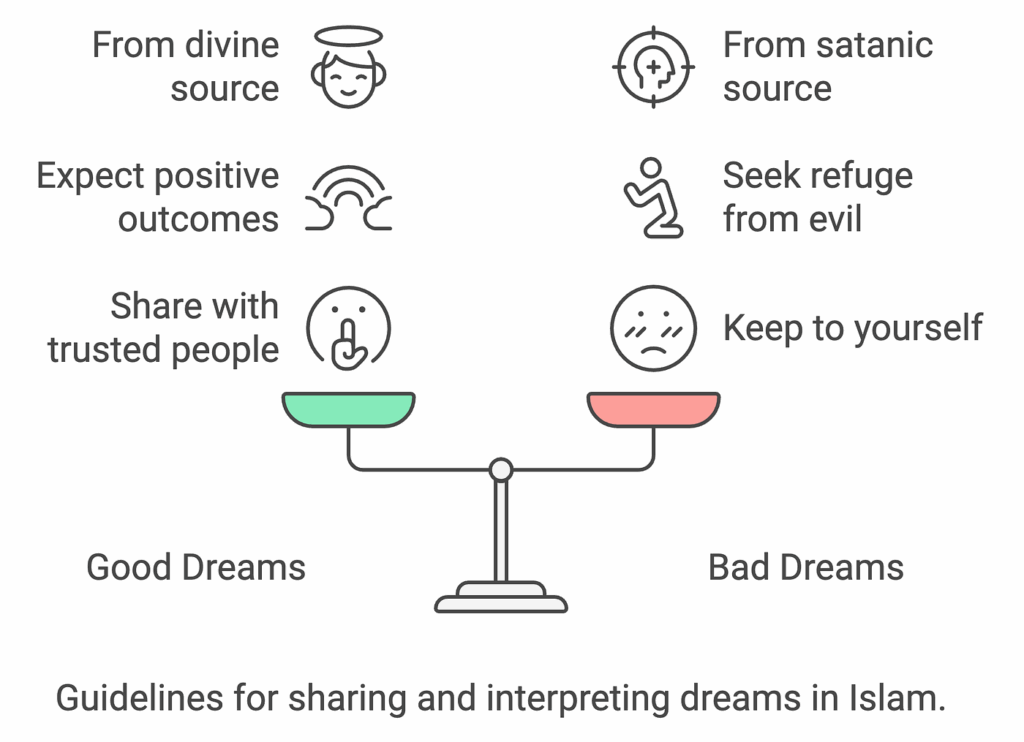
Light – Guidance, knowledge, or faith.
Water – Purity, life, or blessings.
Snakes – Enemies or hidden dangers.
Travel – Change in life or spiritual journey.
Marriage – Unity, provision, or responsibility.
However, context matters. In fact, the same symbol can mean very different things depending on the dreamer’s situation, faith, and life circumstances. Therefore, authentic khawab ki tabeer requires wisdom and knowledge, not just a generic list.
For a clearer and personalized interpretation of your dreams, visit Roohani Ilaj Center.
Misconceptions and Dangers
- Not every dream has meaning. Many are just self-talk.
- Avoid fortune tellers. Seeking dream interpretation from magicians or fake “peers” is shirk.
- Dreams cannot replace the Qur’an and Sunnah. They may inspire, but they do not create laws.
- False dream claims. Narrated Ibn `Umar:
“Allah’s Messenger (ﷺ) said, “The worst lie is that a person claims to have seen a dream which he has not seen.””
(Sahih Bukhari, 7043)
Spiritual Benefits of Understanding Dreams
- Strengthens connection with Allah.
- Provides guidance and reassurance.
- Brings patience and tawakkul.
- Encourages self-reflection and humility.
- Builds gratitude for divine mercy.
Conclusion
Khawab ki tabeer in Islam is a reminder that our lives are not random but divinely guided. While dreams can hold meaning, they must be approached with knowledge, humility, and reliance on Allah. Always refer to the Qur’an and Sunnah, avoid superstition, and seek wisdom from scholars.
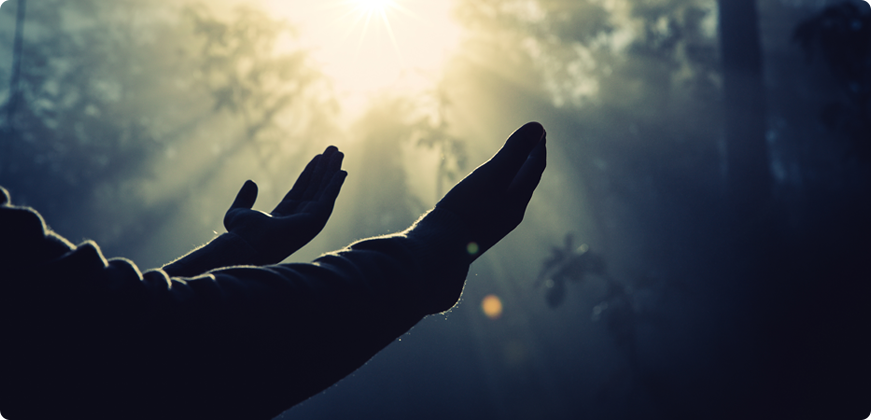
Istikhara in Islam – Complete Guide to Divine Guidance
When facing decisions, Muslims seek guidance through Istikhara in Islam. This blog covers its meaning, purpose, and the authentic method. Moreover, you’ll find a step-by-step guide with clarity at every stage. In addition, common misconceptions are explained to prevent confusion and incorrect practices. Furthermore, practical tips help you recognize signs of Allah’s divine guidance. Consequently, by the end, you’ll know Istikhara in Islam completely.
What is Istikhara in Islam?
Istikhara (Arabic: استخارة) comes from the word khayr (goodness), and it means “to seek goodness or guidance from Allah.” In Islam, Salat al-Istikhara is the prayer Muslims perform to seek Allah’s guidance when making important decisions.
The Prophet Muhammad (ﷺ) taught his companions to perform Istikhara in all matters, big or small. Jabir ibn ‘Abdullah (may Allah be pleased with him) reported:

“When one of you has a matter of concern, let him perform two cycles of prayer besides the obligatory prayers. Then, let him say, ‘O Allah, I seek guidance from Your knowledge and power from Your might, and I ask You from Your tremendous favor. Verily, You have power and I do not have power, and You know and I do not know. You are the Knowing of the Unseen.
O Allah, if You know this matter is good for my religion, my livelihood, and my fate, or if it is better for my present and latter needs, then decree it for me, make it easy for me, and bless me in it. But if You know this matter is evil for my religion, my livelihood, and my fate, or if it is worse for my present and latter needs, then divert it from me, keep me away from it, decree what is good for me, and then make me content with it.‘ Then, let him mention his need.” (Sahih al-Bukhari, 1166).
This Hadith highlights Istikhara’s importance; Muslims should practice it consistently.
The Purpose of Istikhara in Islam
The primary purpose of Istikhara is to seek Allah’s guidance when making decisions. It reflects a believer’s humility, showing that human knowledge is limited, while Allah’s wisdom is infinite.
Key purposes include:
- Seeking clarity and relief from confusion.
- Protecting oneself from regretful decisions.
- Strengthening trust in Allah (tawakkul).
- Gaining peace of heart through divine support.
By performing Istikhara, a Muslim admits: “O Allah, You know what I do not. Guide me towards what is best for my deen, worldly life, and akhirah.”

Evidence of Istikhara in Islam from Hadith
The practice of Istikhara is directly established through authentic Hadith. Narrated `Aisha:
“After offering the two rak`at (Sunna) the Prophet (p.b.u.h) used to talk to me, if I happen to be awake; otherwise he would lie down.” (Sahih al-Bukhari, 1162).
This Hadith confirms that Istikhara is Sunnah, and Muslims should perform it sincerely whenever they face uncertainty.
How to Perform Istikhara Step by Step
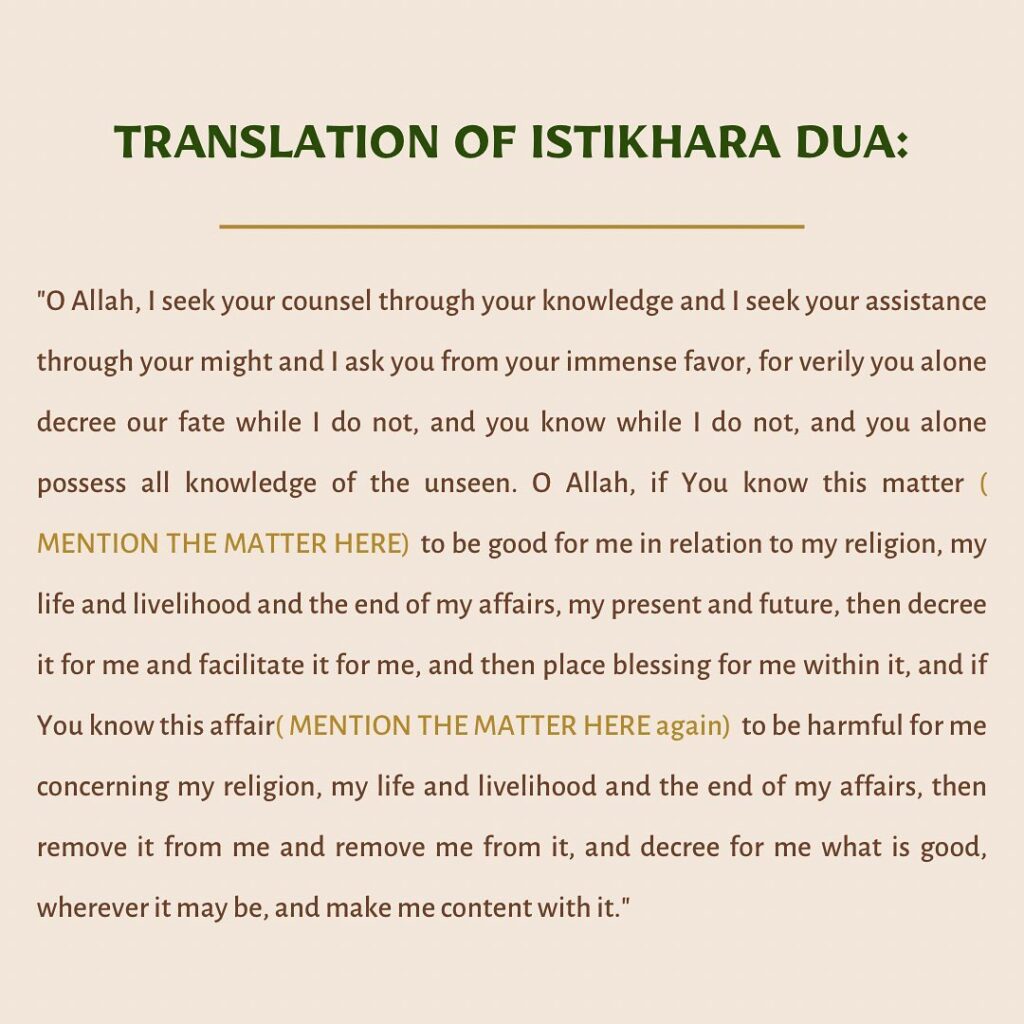
Perform Salat al-Istikhara simply; however, always ensure the correct intention. Here’s a step-by-step guide:
- Make Wudu (ablution): Ensure you are in a state of purity.
- Pray Two Rak‘ahs: Offer two units of voluntary prayer with focus and humility.
- Recite Surah Al-Fatiha & Another Surah: In both rak‘ahs, after Al-Fatiha, recite any Surah you prefer.
- Recite the Du‘a of Istikhara: After completing the prayer, raise your hands and recite the authentic du‘a of Istikhara (recorded in Sahih al-Bukhari).
- Place Your Trust in Allah: After praying, rely on Allah’s guidance and accept whatever outcome follows.
This prayer requires no fixed time; however, perform it best at night.
Common Misconceptions About Istikhara
Despite its simplicity, many misconceptions surround Istikhara:
- Seeing Dreams is Mandatory: It is not necessary to see a dream after Istikhara. Guidance can appear through ease, clarity, or natural unfolding of events.
- Only for Big Decisions: The Prophet (ﷺ) taught his companions to perform Istikhara in all matters, big or small.
- Needs a Scholar to Perform: Istikhara is a personal prayer; anyone can perform it sincerely.
- Instant Results Required: Sometimes guidance is clear immediately, while other times it unfolds gradually.
These misconceptions often confuse, but authentic Hadith clarifies the true method.
Signs of Acceptance of Istikhara
After performing Istikhara, signs of Allah’s guidance may include:
- A sense of peace or comfort towards one decision.
- Events naturally become easier in one direction.
- Removal of obstacles in the chosen path.
- A strong feeling in the heart that aligns with righteousness.
It is important to note that one should remain patient and observant, rather than expecting a miraculous dream or voice.
When to Perform Istikhara?
Muslims perform Istikhara whenever uncertainty arises; therefore, guidance becomes clear.
Common occasions include:
- Marriage proposals.
- Choosing a career or business opportunity.
- Relocating to another city or country.
- Making financial decisions or investments.
- Educational choices.
Essentially, any decision where the outcome is unclear is a valid situation for Istikhara
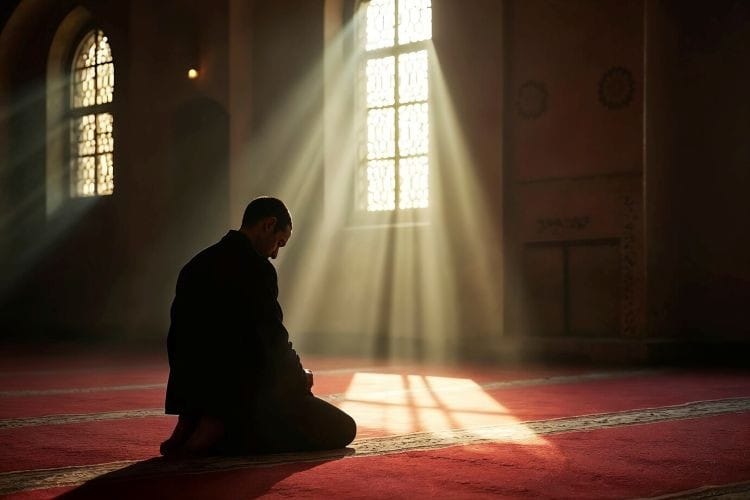
What are the Benefits of Istikhara in Islam?
Performing Istikhara provides numerous spiritual and psychological benefits:
- Strengthens reliance on Allah (tawakkul).
- Reduces stress and anxiety about decisions.
- Brings barakah (blessing) in the chosen path.
- Protects from regret and mistakes.
- Encourages humility and recognition of Allah’s wisdom.
By practicing Istikhara regularly, a Muslim strengthens his relationship with Allah and learns to trust divine decree.
Conclusion
Istikhara is one of the most powerful tools given to Muslims to seek divine help in their daily lives. It is simple, authentic, and deeply rooted in the Sunnah. Instead of relying solely on human judgment, Istikhara connects the believer directly to Allah’s infinite wisdom.
Therefore, may Allah guide us all to make decisions that are best for our faith, our worldly life, and our Hereafter.
For Muslims seeking authentic spiritual practices, it is important to rely only on sources that are rooted in the Qur’an and Sunnah. Moreover, ruqyah, duas, and other forms of Islamic healing should always be practiced in a way that aligns with Shariah and avoids innovation.
To learn more about Istikhara and explore authentic Islamic guidance, you can visit Rohani Istikhara Online – Roohani Ilaj Center, where a wide range of Qur’anic and prophetic supplications are compiled to help strengthen one’s faith and spiritual well-being.
At its core, Istikhara reminds us that every decision should be guided by faith, humility, and trust in Allah’s wisdom. While we seek divine guidance for our personal lives, Islam also encourages us to extend our hands in service to others. Supporting those in need is a form of living by our faith and embodying the mercy that Islam teaches.
Today, countless families in Gaza and other crisis-stricken regions are in urgent need of assistance. By contributing to trusted organizations like Islamic Relief Worldwide, Muslims can fulfill their duty of compassion, channel their duas into action, and bring hope and relief to those who need it most.
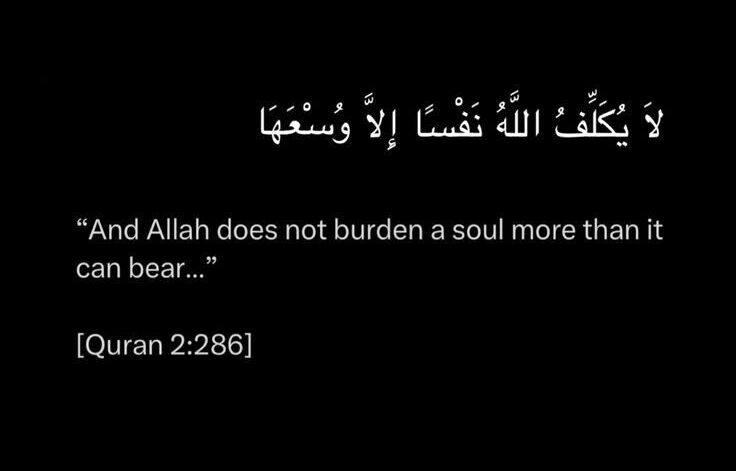
Black Magic in Islam: Meaning & Treatment
In Islam, belief in the unseen (al-ghayb) is a fundamental aspect of faith. Among the unseen realities acknowledged in the Qur’an and Sunnah is the existence of sihr, commonly known as black magic in Islam. Furthermore, sihr is considered one of the most dangerous evils, as it can affect human beings spiritually, emotionally, and even physically.
Allah ﷻ has warned against practicing or seeking help from magic, clearly describing it as an act of disbelief. In addition, the Prophet Muhammad ﷺ himself was afflicted by sihr, demonstrating that no one is truly immune from this trial. However, Allah has also provided clear guidance and remedies through the Qur’an and Sunnah for protection and cure.
In this detailed article, we will explore:
- What is shir in Islam
- Its dangers and ruling
- Signs and symptoms of sihr
- Authentic cures through ruqyah
- Preventive steps for Muslims
What is Black Magic in Islam (Sihr)?
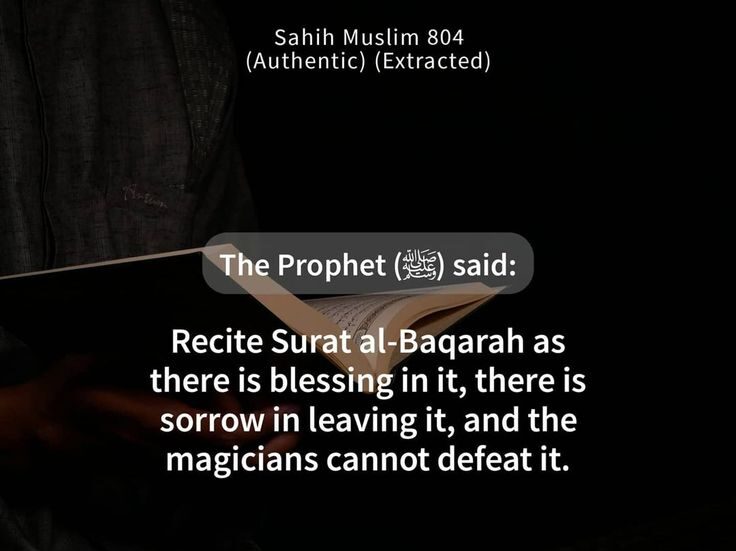
Linguistic and Shariah Definition:
- inguistically: The Arabic word sihr (سِحْر) means ‘hidden’ or ‘secret.’ Consequently, it refers to something subtle that operates in ways that are not immediately visible.
- Islamic definition: Scholars define sihr as spells, incantations, or actions that are carried out with the help of devils (shayatin), and, consequently, are intended to cause harm to people
Qur’anic Evidence:
Allah ﷻ speaks about sihr in the story of Babylon:
“They ˹instead˺ followed the magic promoted by the devils during the reign of Solomon. Never did Solomon disbelieve, rather the devils disbelieved. They taught magic to the people, along with what had been revealed to the two angels, Hârût and Mârût, in Babylon.1 The two angels never taught anyone without saying, “We are only a test ˹for you˺, so do not abandon ˹your˺ faith.” Yet people learned ˹magic˺ that caused a rift ˹even˺ between husband and wife; although their magic could not harm anyone except by Allah’s Will. They learned what harmed them and did not benefit them—although they already knew that whoever buys into magic would have no share in the Hereafter. Miserable indeed was the price for which they sold their souls, if only they knew!”
(Qur’an 2:102)
This verse confirms three realities:
- Sihr is real and can cause harm.
- It is a form of disbelief when learned or practiced.
- However, its effect occurs only by Allah’s will, meaning that no magic can cause harm except by His decree.
Ruling on Black Magic in Islam:
- Practicing sihr is haram (strictly forbidden) and one of the major sins.
- Islam forbids seeking help from magicians or soothsayers. Safiyya reported from some of the wives of Allah’s Apostle (ﷺ), Allah’s Apostle (ﷺ) having said:
“He who visits a diviner (‘Arraf) and asks him about anything, his prayers extending to forty nights will not be accepted.”
(Sahih Muslim 2230)
And in another narration:
Furthermore, it was narrated that Abu Hurairah said:
“The Messenger of Allah [SAW] said: ‘Whoever ties a know and blows on it, he has practiced magic; and whoever practices magic, he has committed Shirk; and whoever hangs up something (as an amulet) will be entrusted to it.'”
(Sunan al-Nasa’i 4079, Hasan)
Types of Sihr
Islamic scholars mention different forms of sihr, such as:
- Sihr of separation (tafriq): Causing discord between husband and wife.
- Sihr of love (mahabba): Forcing unnatural attraction.
- Sihr of illness: Causing unexplained sickness.
- Sihr of madness: Affecting the mind with confusion or hallucinations.
- Sihr of death: Attempting to cause fatal harm.
All these are real but forbidden practices.
Signs and Symptoms of Black Magic
Not every illness or difficulty is due to sihr. Islam teaches us to maintain balance: we should treat medical issues medically and address spiritual issues through ruqyah. However, scholars mention certain possible signs of sihr:
General Symptoms:
- For example, a sudden change in behavior without any clear reason may indicate the harmful influence of sihr.
- Moreover, it can manifest as constant fatigue or laziness, even when there is no medical cause.
- Additionally, it may lead to sudden hatred between spouses or family members, straining close relationships unexpectedly.
- Frequent disturbing dreams or nightmares
- Moreover, unexplained physical pain that doctors cannot diagnose often leaves individuals feeling frustrated and anxious, as they struggle to find answers and effective treatment.
Signs in the Qur’an and Sunnah:
Narrated Aisha:
Magic was worked on Allah’s Messenger (ﷺ) so that he used to think that he had sexual relations with his wives while he actually had not (Sufyan said: That is the hardest kind of magic as it has such an effect). Then one day he said, “O `Aisha do you know that Allah has instructed me concerning the matter I asked Him about? Two men came to me and one of them sat near my head and the other sat near my feet. The one near my head asked the other. What is wrong with this man?’
The latter replied the is under the effect of magic The first one asked, Who has worked magic on him?’ The other replied Labid bin Al-A’sam, a man from Bani Zuraiq who was an ally of the Jews and was a hypocrite.’ The first one asked, What material did he use)?’ The other replied, ‘A comb and the hair stuck to it.’ The first one asked, ‘Where (is that)?’
The other replied. ‘In a skin of pollen of a male date palm tree kept under a stone in the well of Dharwan’ ” So the Prophet (ﷺ) went to that well and took out those things and said “That was the well which was shown to me (in a dream) Its water looked like the infusion of Henna leaves and its date-palm trees looked like the heads of devils.” The Prophet (ﷺ) added, “Then that thing was taken out’ I said (to the Prophet (ﷺ) ) “Why do you not treat yourself with Nashra?” He said, “Allah has cured me; I dislike to let evil spread among my people.” (Bukhari 5765, Muslim 2189).
Therefore, confusion, forgetfulness, and mental disturbance can also be among the effects of sihr.
Dangers of Black Magic
- Spiritual harm: It weakens faith and creates doubts.
- Family destruction: Causes separation and hatred between loved ones.
- Physical illness: Leads to real sickness and pain.
- Disbelief (kufr): Practicing magic or seeking magicians leads to shirk.
Cure for Black Magic in Islam
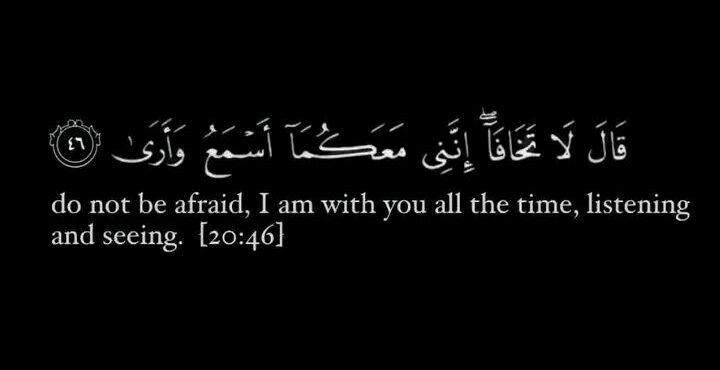
Islam provides clear, authentic methods of curing sihr through ruqyah shariah.
Qur’anic Verses for Healing:
- Surah Al-Fatiha – Known as a healing chapter.
- Ayat al-Kursi (2:255) – Protection against devils.
- Surah Al-Baqarah (2:102, 2:255, 2:285-286) – Powerful verses against sihr.
- Surah Al-Ikhlas, Al-Falaq, Al-Nas – The Prophet ﷺ recited them for protection when afflicted by sihr.
Sunnah Remedies:
Narrated A’ishah (RA):
“A man called Labid bin al-A’sam from the tribe of Bani Zaraiq worked magic on Allah’s Messenger (ﷺ) till Allah’s Messenger (ﷺ) started imagining that he had done a thing that he had not really done. One day or one night he was with us, he invoked Allah and invoked for a long period, and then said, “O `Aisha! Do you know that Allah has instructed me concerning the matter I have asked him about? Two men came to me and one of them sat near my head and the other near my feet. One of them said to his companion, “What is the disease of this man?”
The other replied, “He is under the effect of magic.’ The first one asked, ‘Who has worked the magic on him?’ The other replied, “Labid bin Al-A’sam.’ The first one asked, ‘What material did he use?’ The other replied, ‘A comb and the hairs stuck to it and the skin of pollen of a male date palm.’ The first one asked, ‘Where is that?’ The other replied, ‘(That is) in the well of Dharwan;’ ” So Allah’s Messenger (ﷺ) along with some of his companions went there and came back saying, “O `Aisha, the color of its water is like the infusion of Henna leaves.
The tops of the date-palm trees near it are like the heads of the devils.” I asked. “O Allah’s Messenger (ﷺ)? Why did you not show it (to the people)?” He said, “Since Allah cured me, I disliked to let evil spread among the people.” Then he ordered that the well be filled up with earth.”
(Sahih al-Bukhari 5763, Sahih Muslim 2189)
Step-by-Step Ruqyah for Black Magic:
- Make intention (niyyah) that cure comes from Allah alone.
- Recite:
- Surah Al-Fatiha (7 times)
- Ayat al-Kursi (2:255)
- Surah Al-Baqarah verses (2:102, 285-286)
- Surah Al-Ikhlas, Al-Falaq, Al-Nas (3 times each)
- Blow gently into water after reciting.
- Then, drink some of the water and use the rest for bathing, allowing it to take effect.
- Make sure to repeat this daily, both in the morning and in the evening, for best results.
Authentic Duas for Healing:
Narrated `Abdul `Aziz:
Thabit and I went to Anas bin Malik. Thabit said, “O Abu Hamza! I am sick.” On that Anas said, “Shall I treat you with the Ruqya of Allah’s Messenger (ﷺ)?” Thabit said, “Yes,” Anas recited, “O Allah! The Lord of the people, the Remover of trouble! (Please) cure (Heal) (this patient), for You are the Healer. None brings about healing but You; a healing that will leave behind no ailment.”
(Sahih al-Bukhari 5742, Sahih Muslim 2191)
Preventive Measures Against Sihr
- Recite Ayat al-Kursi after every obligatory prayer.
- Recite the last two verses of Surah Al-Baqarah at night.
- Perform morning and evening adhkar daily.
- Say Bismillah before eating, entering home, and other actions.
- Moreover, always keep close to Allah through regular prayer, recitation of the Qur’an, and heartfelt dua.
Common Misconceptions About Black Magic In Islam
- Not every problem is sihr: It is important to remember that many issues may be medical or psychological; therefore, always seek professional medical help alongside performing ruqyah.
- Amulets and charms are not Islamic: Using taweez with unknown writings or calling upon jinn is shirk.
- Only Qur’an and Sunnah-based ruqyah is valid: Islam forbids any practice that involves shirk or superstition.
Benefits of Ruqyah Against Sihr
- Brings protection from Allah alone.
- Strengthens faith and tawakkul (reliance on Allah).
- Provides peace of heart and relief from distress.
- Breaks the effects of sihr without resorting to forbidden means.
Conclusion
Indeed, black magic (sihr) is real, extremely dangerous, and clearly condemned in Islam. Moreover, it serves as a tool of shayatin that not only harms individuals but also disrupts families and corrupts societies.. However, Allah ﷻ has provided healing and protection through the Qur’an and Sunnah.
Muslims must avoid shirk, fortune-tellers, and superstitions. Instead, they should rely on ruqyah shariah, daily adhkar, and trust in Allah. True protection and cure come only from Him.
“And He ˹alone˺ heals me when I am sick.”
(Qur’an 26:80)
If you or someone you know is experiencing the harmful effects of sihr (black magic), remember that true healing and protection come only through the Qur’an, Sunnah, and complete reliance on Allah ﷻ. For more guidance, resources, and Islamic solutions, visit What Is Magic? to understand this issue in detail and learn how to protect yourself and your loved ones.
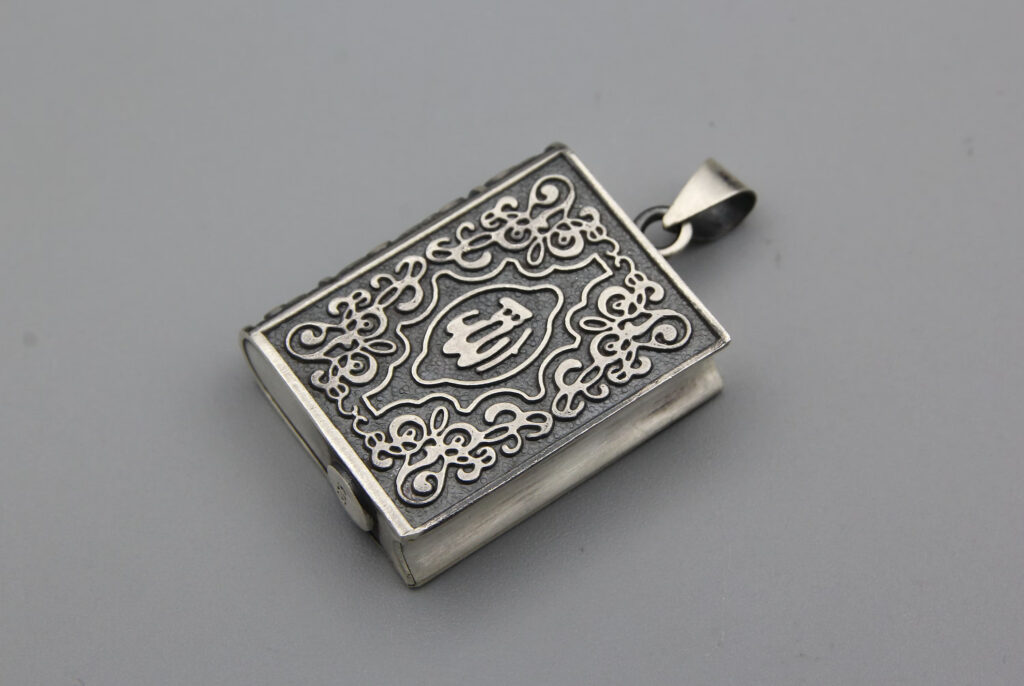
Taweez in Islam: Use, Misuse & Guidance
Many Muslims are uncertain about taweez in Islam (amulets), whether they are allowed, when they cross into impermissibility, and how to use them without violating tawheed. Because it deals with spiritual matters and protection, it is a sensitive topic.
In this post, we will cover:
- Definition of taweez and differences between lawful and unlawful forms
- Criteria for a valid taweez under Shariah
- Situations when a taweez may be used (if permissible)
- How to obtain a genuine taweez and avoid fraud
- How to read, carry, care, and renew a taweez
- Examples and stories of misuse and warnings
Throughout, we will refer to Qur’anic verses, hadith, and scholarly positions to maintain accuracy and balance.
What Is a Taweez In Islam? Definition & Basic Understanding
- A taweez (تعويذ, also spelt tawiz, taʿwīdh) commonly means an amulet or written supplication, worn or carried for protection, healing, or blessing.
- In practice, many taweez are small pieces of paper, leather, metal, or cloth with verses of the Qur’an, duʿāʾ, names of Allah, or sometimes symbols, numbers, or other unknown words.
- The central concern is: Does the taweez rely solely on Allah, or does it claim power for itself? If a person thinks the amulet itself (rather than Allah) protects, that is problematic.
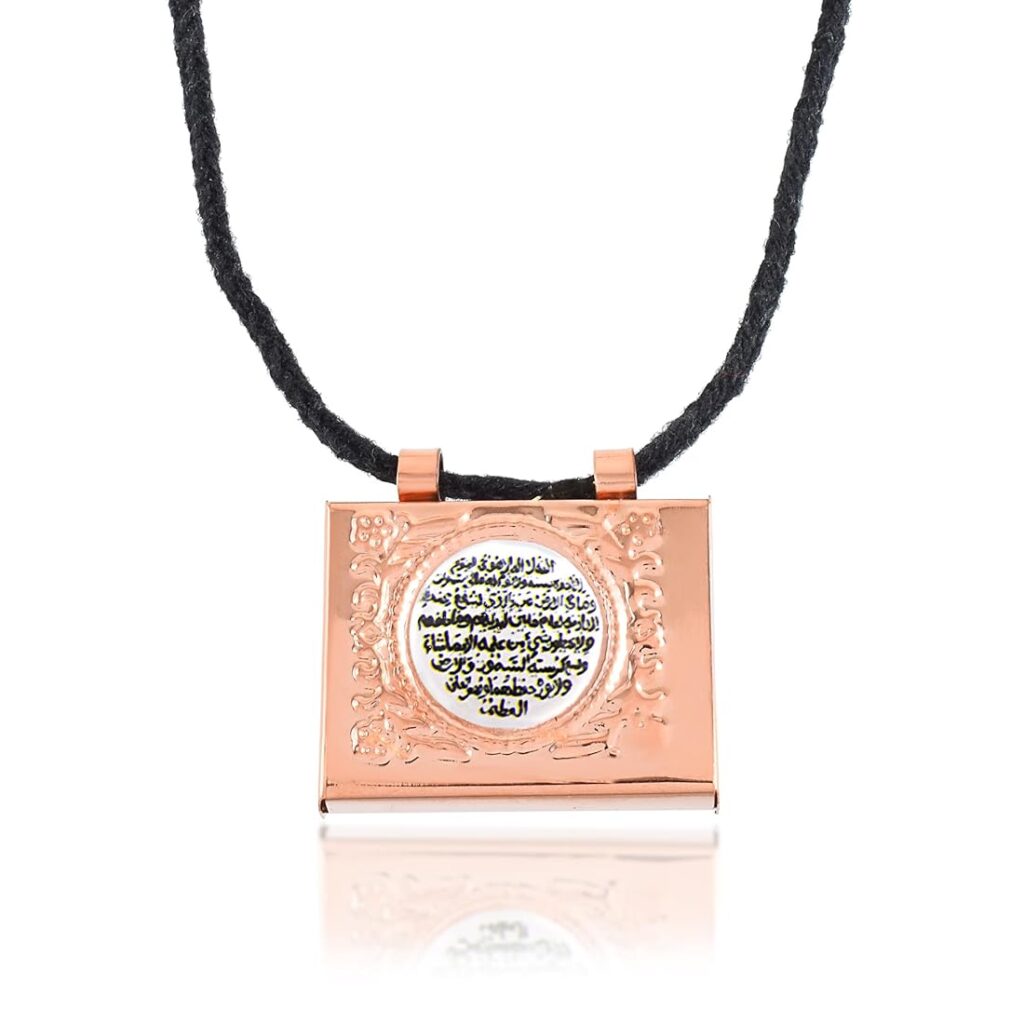
Some scholars even define taweez broadly — anything hung for protection (e.g., around the neck, inside the house). So the term overlaps with amulet, tamīmah, etc.
Evidence & Warnings from Qur’an & Hadith

1. General principle: Only Allah controls benefit and harm
Allah says:
“Say, ‘I do not hold for myself [the power of] benefit or harm, except what Allah has willed.’” (Qur’an 7:188)
This verse reminds us that benefit or harm never comes from things in and of themselves, except by Allah’s leave.
2. Hadith condemning amulets / taweez in Islam
- Uqbah ibn ‘Amir reports the Prophet ﷺ said:
“The Messenger of Allah, peace and blessings be upon him, received a group of men and he accepted the pledge of nine of them, while he refrained from one. They said, “O Messenger of Allah, you accepted the pledge of nine men and left this one out?” The Prophet said, “Verily, there is an amulet upon him.” The man took it in his hand and cut it, then the Prophet accepted his pledge and he said, “Whoever hangs an amulet around his neck has committed an act of idolatry.”
(Musnad Aḥmad 17388)
- Several scholars conclude from hadith that amulets containing words not from the Qur’an or known supplications, or those involving unknown symbols, fall into the category of shirk (associating partners with Allah).
- Some hadith traditions state that incantations, amulets, and love spells are among the practices of shirk when misused.
- Ibn Mas‘ud is reported to have disapproved of hanging anything from the Qur’an around the neck.
Thus, the texts clearly caution against using taweez in ways that elevate them above mere signs or reminders.
Scholarly Positions & Differences
Because of the textual evidence and the sensitivity involved, scholars have differed. Broadly, there are two main approaches:
Position A: Prohibition or strong caution
- Many scholars argue that Islam disallows all taweezes because of the generality of the hadith condemning amulets and incantations. They see that allowing any taweez opens the door to superstition and shirk.
- They argue that even when someone includes Qur’anic verses, the default ruling prohibits taweez unless clear evidence permits that specific case.
- Some hold that the Prophet ﷺ never wore a taweez, and there is no solid hadith showing him doing so. Thus, they say we should avoid all amulets.
Position B: Conditional permissibility
- Other scholars, especially in the Hanafi school and among certain classical jurists, permit taweez when people fulfill strict conditions.
- For instance, a taweez remains permissible only if it contains Qur’anic verses, names of Allah, or authentic duʿāʾ; if the bearer understands its language; if the person relies solely on Allah rather than the taweez itself; and if it avoids any element of disbelief or unknown invocation.
- In Hanafi Fiqh (Daruliftaa), scholars say amulets are permissible with conditions:
“Hanging or wearing of amulets (ta’wiz) is normally permissible for protection or healing, provided certain conditions are met:
- They consist of the names of Allah Almighty or His attributes;
- They are in Arabic.
- They do not consist of anything that is disbelief (kufr);
- The user does not believe the words have any effect in themselves, but that effect is by Allah.”
- They consist of the names of Allah Almighty or His attributes;
- In Hanafi Fiqh (Daruliftaa), scholars say amulets are permissible with conditions:
- Some jurists allow writing Qur’an verses and placing them in water for drinking, calling it ruqyah, not necessarily a taweez.
Thus, safer practice, according to many, is to rely on ruqyah (recitation) rather than physical amulets or restrict amulets strictly.
Criteria for a Valid (Permissible) Taweez In Islam
Scholars who hold the more lenient view (with caution) often give the following criteria:
- Contains only Qur’anic verses, names of Allah, or authentic duʿāʾ (no unknown or invented words, no invocation of jinn or spirits).
- Written in a language understood by the user (so that one knows what one is carrying).
- No symbols, numbers, diagrams, boxes, cryptic signs — these often belong to occult or magical use.
- Belief must be correct: the user must know that the taweez itself does not have independent power; it is Allah who grants benefit/harm.
- Pure materials: the taweez in islam should not be on impure or prohibited substances.
- Kept in respect: not placed in unclean places, not used wrongly, not worn in disbelief.
- Renew & check regularly: ensure the taweez continues to meet conditions, and that the person’s belief is sound.
If anyone violates these conditions, scholars argue that the taweez becomes impermissible and may even lead to shirk.
Situations Where a Taweez In Islam May Be Used (According to Permissive Opinions)
- Protection: against the evil eye (ʿayn), envy, harm.
- Health/healing: for someone physically weak or ill, when they cannot recite or memorize necessary supplications.
- Difficulties: for relief in hardship, anxiety, or spiritual distress.
- Children / the elderly: some scholars permit it for those unable to memorize protective duʿāʾ.
However, even in these cases, the preference is to use ruqyah (recitation) as the primary method. The taweez should only assist, not replace recitation and trust in Allah.
How to Obtain a Genuine Taweez & Avoid Fraud
Because taweezes are subject to abuse, many people fall prey to fraudulent practices. Here’s how to protect yourself:
- Use only reputable, known scholars or institutes that follow the Quran & Sunnah strictly.
- Ask to see the text (verses or duʿāʾ) and confirm it matches known authentic supplications.
- Avoid secretive sellers who refuse to show what’s inside.
- Check for suspicious signs: mix of symbols, cryptic letters, invocation of jinn names, inverted scripts, random numbers.
- Get a second scholarly opinion before using.
- Avoid exaggerated claims: do not accept someone claiming guaranteed outcomes or that taweez itself has magical powers.
- Ensure purity: materials used should be halal, papers shouldn’t come soaked with substances or hidden inks.
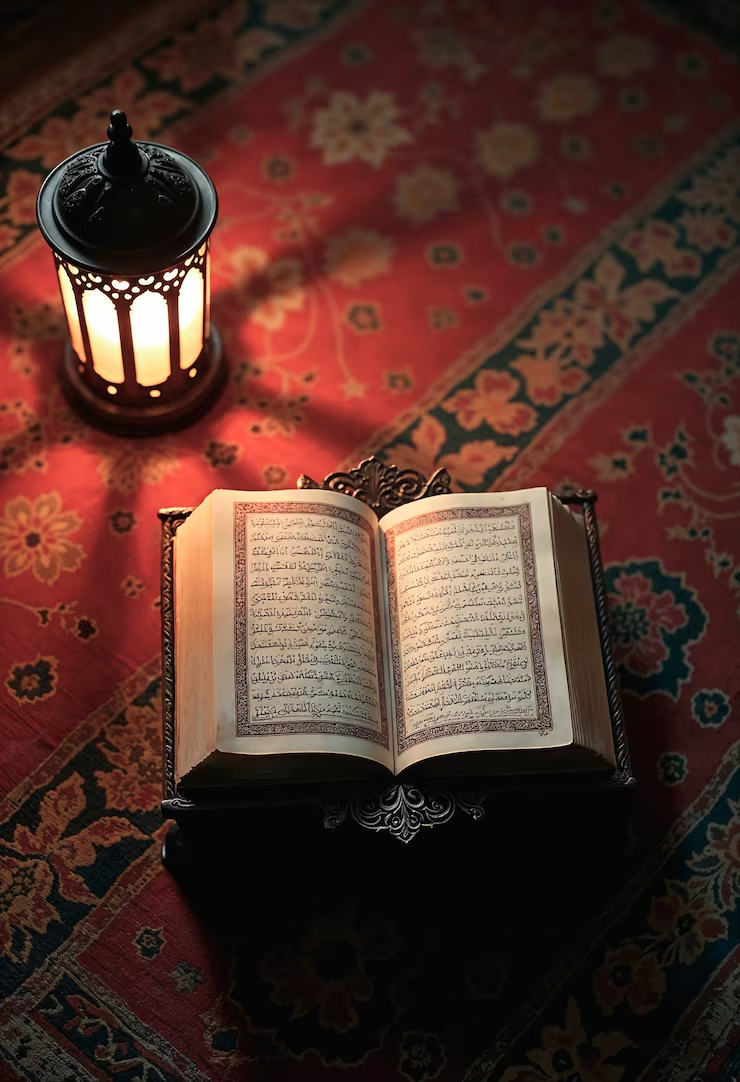
How to Read, Carry, Care & Renew a Taweez In Islam
A Muslim must use even a permissible taweez with care:
- How to read/activate: A person often reads the taweez, makes supplication over it, or recites some duʿāʾalways believing in Allah’s power, not in the amulet itself.
- Carrying it: It may be worn (neck, wrist) or kept in clothing or a pocket, but ensure it’s treated with respect and not placed among trash or unclean places.
- Care/cleanliness: Keep it in a clean protective cover, avoid water damage, moths, and insects.
- Renewal/review: Periodically re-examine belief, check that conditions (e.g., correct text, no alterations) are still valid, and discard if anything doubtful arises (by burning or burying respectfully).
- When to remove: If the taweez is causing doubts, showing signs of damage or impurity, or if the person’s belief is shifting, remove it.
Misuse & Warnings: Stories & Indicators
Examples of Misuse
- A taweez that includes unknown names, spirits, or jinn invocation — people believing the object itself will protect, neglecting Allah.
- Taweezes sold for exorbitant prices with claims of guaranteed results (e.g., “this will force someone to love you”) — fraudulent, likely shirk.
- Commercial shops printing random symbols, stars, numbers in foreign scripts without clear meaning — such taweezes are clearly prohibited.
- People treat taweez as a talisman of luck, putting it into cars, wallets, and houses in superstitious ways.
Indicators that a Taweez Has Become Prohibited
- If the person begins to depend on the taweez and distrusts Allah’s power.
- If shirk or invoking other than Allah becomes part of its use.
- If it contains unknown or suspicious wording or symbols not from the Qur’an or Sunnah.
- If the taweez is respected more than the Qur’an, or is conducted in secret rituals.
- If the one who made it doesn’t follow its own advice or demands heavy payment.
Warning: many scholars caution that even permissible taweezes are better avoided due to the risk of entering prohibited territory (a principle known as sadd al-dharaʾiʿ, blocking means).
Comparative Emphasis: Ruqyah vs. Taweez
- Ruqyah is the recitation of Qur’anic verses and authentic supplications orally. It is widely accepted and less controversial.
- Taweez (physical objects) add a layer of complexity: risk of shirk, superstition, and fraud.
- Many scholars say: when in doubt, stick to ruqyah.
- Some practices of taweez (writing verses into water and then drinking) are considered by some scholars to be a form of ruqyah, rather than a forbidden amulet.
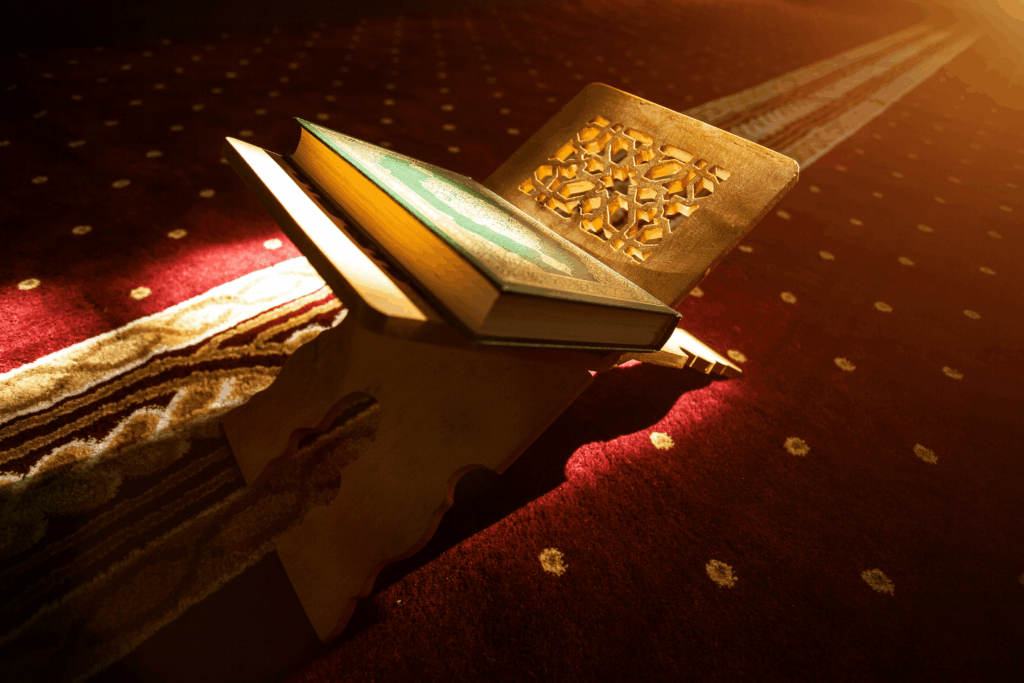
Conclusion
Taweez (amulets) is one of the most debated topics in Islamic practice. On one side, we have strong hadith warnings against charm-based amulets and incantations, and on the other side, qualified scholarly opinions that permit it under stringent conditions.
If someone chooses to use a taweez:
- Ensure it contains only Qur’anic verses, names of Allah, or authentic duʿāʾ
- Avoid any element of shirk, unknown symbols, or invocation of spirits
- Maintain the belief that Allah is the only One Who grants benefit and protection
- Use it properly — carry it respectfully, renew it, verify its contents
- Avoid commercial, fraudulent, exaggerated claims
Even so, the safest, least controversial, and most universally accepted method remains ruqyah through recitation, supplication, and reliance on Allah.When dealing with such sensitive matters, always rely on trustworthy scholars for your particular madhhab (school) and context. May Allah protect us from error, preserve our tawheed, and accept our efforts in sincerity.
While taweez in Islam should always be approached with caution and only within the limits of Qur’an and Sunnah, Muslims are also encouraged to turn to authentic practices that strengthen their faith and connection with Allah. One of the most powerful ways is through Qur’anic supplications and prophetic duas that bring protection, healing, and peace. To access a collection of authentic Islamic supplications, visit our page on Rohani Wazaif.
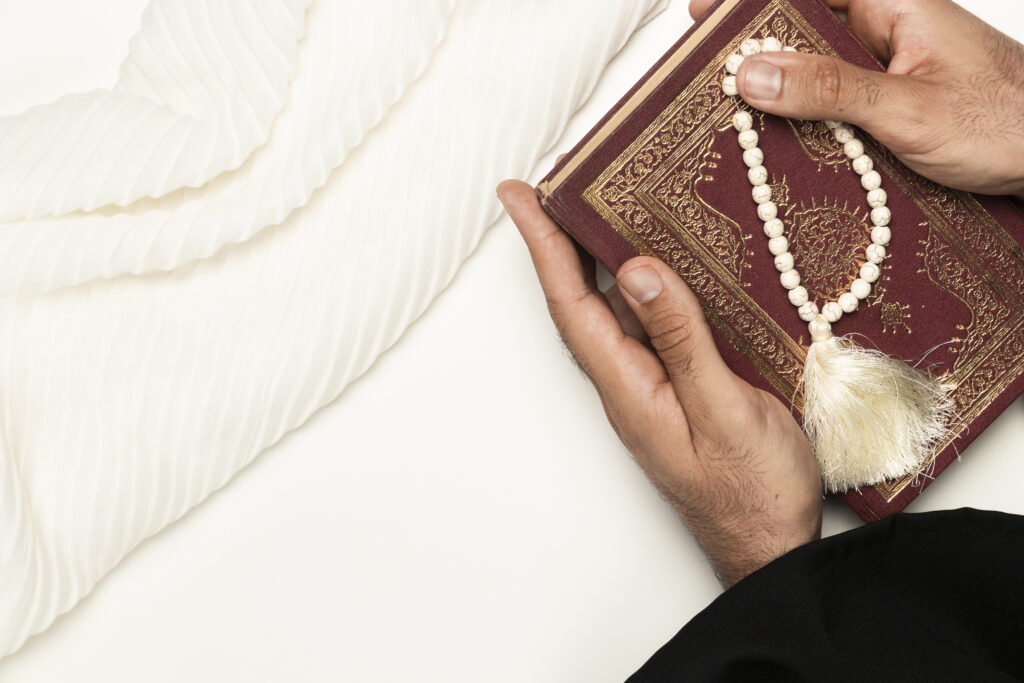
Ruqyah in Islam: Healing with Qur’an & Sunnah
In Islam, spiritual healing is not a new concept. For centuries, Muslims have turned to Ruqyah in Islam, the practice of reciting Qur’anic verses and authentic duʿa to seek protection, healing, and peace. Unlike superstition or harmful practices, ruqyah is deeply rooted in the Qur’an and Sunnah, making it a legitimate and powerful form of Islamic healing.
This article will also address common misconceptions that people often hold, helping to distinguish authentic Islamic spiritual healing from mere cultural superstition. Ultimately, it aims to guide Muslims in strengthening their reliance on Allah and seeking protection and healing through Shariah-compliant and spiritually uplifting means. In the following sections, we will explore the meaning of ruqyah, present its evidence from the Qur’an and Hadith, explain the correct way to perform it, highlight its benefits, and clarify the misconceptions surrounding it.
What is Ruqyah in Islam?
Definition: Ruqyah (الرُّقْيَة) refers to reciting Qur’an, supplications, or names of Allah over someone to seek a cure and protection.
Purpose: It protects against::
- The evil eye (al-‘ayn)
- Black magic (sihr)
- Jinn disturbances
- Physical, emotional, or spiritual illness
Key Verse:
“We send down the Quran as a healing and mercy for the believers, but it only increases the wrongdoers in loss.”
(Qur’an 17:82)
This verse highlights that the Qur’an is a source of healing—not only for the body but also for the heart and soul.
Evidence of Ruqyah in Islam from the Sunnah
1. The Prophet ﷺ Encouraged Ruqyah:
Narrated `Aisha:
“Whenever Allah’s Messenger (ﷺ) became sick, he would recite Mu’awwidhat (Surat Al-Falaq and Surat An-Nas) and then blow his breath over his body. When he became seriously ill, I used to recite (these two Suras) and rub his hands over his body hoping for its blessings.”
(Sahih al-Bukhari 5016)
This demonstrates that the Prophet ﷺ himself employed ruqyah, thereby proving it is a Sunnah and not an innovation.
2. Ruqyah is Not Shirk When Done Correctly:
‘Auf b. Malik Ashja’i reported:
“We practised incantation in the pre-Islamic days and we said: Allah’s Messenger, what is your opinion about it? He said: Let me know your invocation and said: There is no harm in the invocation as long as there is no polytheism in it.”
(Sahih Muslim 2200)
This hadith clarifies that ruqyah shariah is permissible, while ruqyah involving shirk—calling upon anyone other than Allah, is forbidden.
3. Healing with Surah Al-Fatiha:
Narrated Abu Sa`id Al-Khudri:
Some of the companions of the Prophet (ﷺ) came across a tribe … One of them started reciting Surat-al-Fatiha and gathering his saliva and spitting it (at the snake-bite). The patient got cured … When they asked the Prophet ﷺ, he smiled and said, “How do you know that Surat-al-Fatiha is a Ruqya? Take it (flock of sheep) and assign a share for me.”
(Sahih Bukhari 5736, Sahih Muslim 2201)
This authentic narration proves that Surah Al-Fatiha is a powerful healing chapter in the Qur’an.
Types of Ruqyah in Islam
Ruqyah Shariah (Permissible):
- Uses Qur’anic verses (Surah Fatiha, Ayat-ul-Kursi, Surah Ikhlas, Surah Falaq, Surah Nas).
- Includes authentic duas taught by the Prophet ﷺ.
- Recited with sincerity, without shirk or dependence on other than Allah.
Ruqyah Shirk (Forbidden):
- Involves calling upon jinn, spirits, or names other than Allah.
- Instead, charms, talismans, or rituals with no basis in the Qur’an or Sunnah are often included.
- Strictly prohibited and considered a form of shirk.
How to Perform Ruqyah in Islam (Step-by-Step Guide)
- Intention (Niyyah): It is begun with the belief that healing comes from Allah alone.
- Recite Qur’an and Duas:
- Surah Al-Fatiha (7 times)
- Ayat-ul-Kursi (Surah Al-Baqarah 2:255)
- Surah Ikhlas, Surah Falaq, Surah Nas (3 times each)
- Blow Gently: After reciting, gently blow on your hands and wipe them over the body.
- Consistency: Ruqyah should be repeated regularly, especially morning and evening.
- Supplication (Dua):
Narrated Abdul Aziz:
Thabit and I went to Anas bin Malik. Thabit said, “O Abu Hamza! I am sick.” On that Anas said, “Shall I treat you with the Ruqya of Allah’s Messenger (ﷺ)?” Thabit said, “Yes,” Anas recited:
“O Allah! The Lord of the people, the Remover of trouble! (Please) cure (Heal) (this patient), for You are the Healer. None brings about healing but You; a healing that will leave behind no ailment.”
(Sahih Bukhari 5742, Sahih Muslim 2191)
Common Misconceptions About Ruqyah in Islam
Ruqyah is not a form of magic or superstition — it is firmly rooted in the Qur’an and Sunnah. Many Muslims seek it as protection from the evil eye, black magic, and jinn disturbances, but it is equally beneficial for peace of heart and spiritual strength. Importantly, ruqyah should never be commercialized or turned into exploitation. Islam also encourages believers to combine ruqyah with proper medical treatment, ensuring a balanced approach to healing.
For further scholarly guidance, you can read this fatwa on ruqyah, which explains its correct practice according to Shariah.
Benefits of Ruqyah in Islam for Healing and Protection
- In addition, Muslims seek protection from the evil eye, envy, and black magic.
- Furthermore, Muslims seek healing for emotional distress, anxiety, and spiritual weakness.
- Peace of heart through connection with Allah.
- Strengthening faith and reliance on Qur’an & Sunnah.
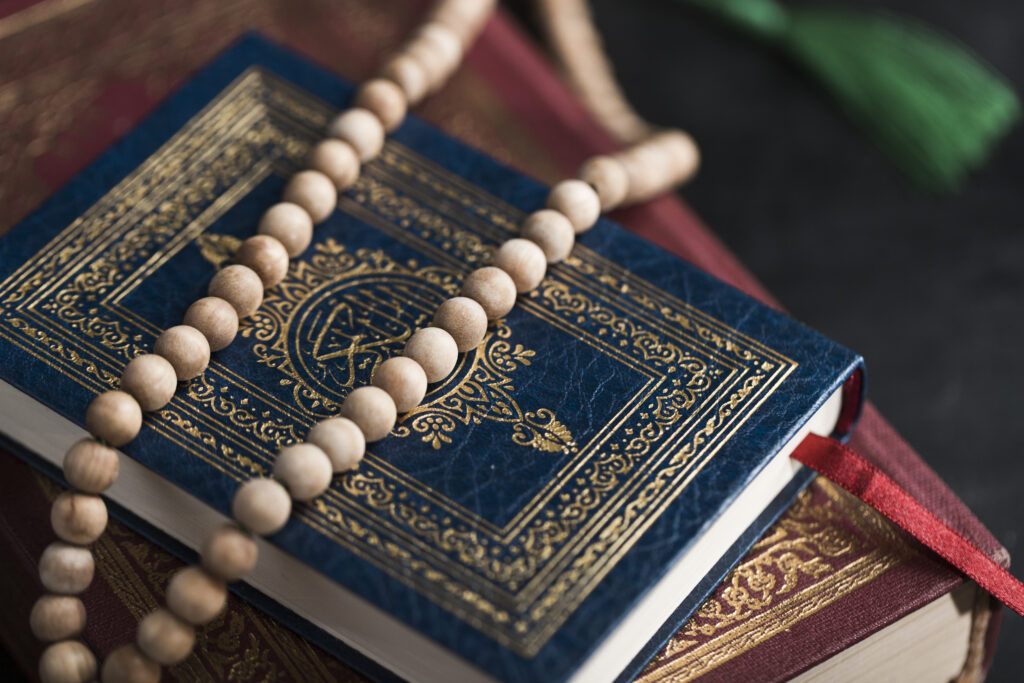
FAQ on Ruqyah
Q1: Does Islam allow Muslims to perform ruqyah?
Yes, Islam allows and encourages Muslims to perform ruqyah according to the Qur’an and Sunnah, as long as they avoid shirk.
Q2: Which Surahs do Muslims recite in ruqyah?
Moreover, Muslims frequently recite Surah Al-Fatiha, Ayat-ul-Kursi, Surah Ikhlas, Surah Falaq, and Surah Nas.
Q3: Can Ruqyah replace medicine?
No. Ruqyah is a spiritual cure, but Islam encourages believers to also seek medical treatment.
Q4: Can ruqyah protect against jinn and black magic?
Yes. Ruqyah shariah protects against harmful spiritual forces such as jinn and sihr (black magic).
Conclusion
Indeed, ruqyah in Islam serves as a beautiful reminder that true healing comes only from Allah. Through the Qur’an, duas, and Sunnah practices, Muslims seek protection from harm, find relief from illness, and experience inner peace. However, believers must avoid superstition and fraudulent practices. Muslims should always perform ruqyah according to Shariah and rely completely on Allah’s mercy.
“And He ˹alone˺ heals me when I am sick.”
(Qur’an 26:80)
For Muslims seeking authentic guidance and real-life references on spiritual healing, turning to trusted sources is essential. When exploring rohani wazaif, Qur’anic duas, and Islamic spiritual practices, it is important to ensure they are firmly rooted in the Qur’an and Sunnah. Roohani Ilaj Center’s Rohani Wazaif page serves as a reliable resource for this purpose. The platform provides Shariah-compliant knowledge that helps Muslims strengthen their connection with Allah. By following such authentic guidance, believers can protect themselves from negative influences such as the evil eye, black magic, and disturbances caused by jinn. Relying on trustworthy sources makes spiritual healing both meaningful and beneficial in a Muslim’s life.
